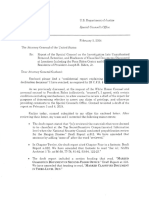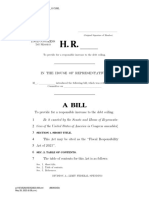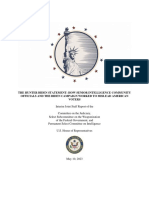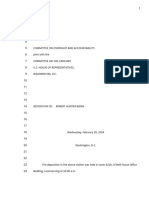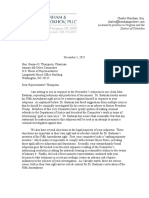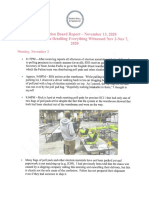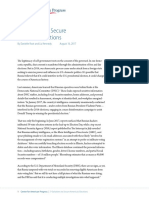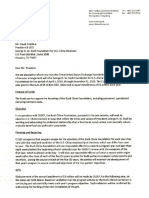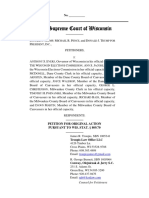Professional Documents
Culture Documents
Trump's Draft Executive Order On Tech Censorship
Uploaded by
Raheem Kassam90%(20)90% found this document useful (20 votes)
97K views6 pagesPresident Trump is expected to sign this EO on Thursday.
Original Title
Trump's Draft Executive Order on Tech Censorship
Copyright
© © All Rights Reserved
Available Formats
PDF or read online from Scribd
Share this document
Did you find this document useful?
Is this content inappropriate?
Report this DocumentPresident Trump is expected to sign this EO on Thursday.
Copyright:
© All Rights Reserved
Available Formats
Download as PDF or read online from Scribd
90%(20)90% found this document useful (20 votes)
97K views6 pagesTrump's Draft Executive Order On Tech Censorship
Uploaded by
Raheem KassamPresident Trump is expected to sign this EO on Thursday.
Copyright:
© All Rights Reserved
Available Formats
Download as PDF or read online from Scribd
You are on page 1of 6
DELIBERATIVE/PRE-DECISIONAL/PRIVILEGED.
EXECUTIVE ORDER
PREVENTING ONLINE
By the authority vested in ma as Proeident by ion and the laws of the United
States of America, including the Federal Pr: ative Services Act of 1943,
a8 amended (40 U.S.C. 101 and 121(a)}, it 1 cllowa?
Section 1. Policy.
Free speech is the bedrock of
sacred right with the First Amendment
express and debate ideas is the foundal
Our Founding Fathers protected this
ny underscoring that the freedom to
‘The emergence and growth
about applying the ideal
Today, many Americana fol|
their’ views on current evant:
those platforms func
ars raises important questions
modern conmunications technology.
ith friends and family, and share
iia and other online platforms. As a results
jentury equivalent of the public square.
As President, to free and open debate on the Internet.
Such debate is 5) . in our universities, our businesses, our
newspapers, and ourthignes, 1 to sustaining our danocracy,
In a country tha fied the freedom of expression, wo cannct allow a
ito hand-pick the speech that Ancricans may acceso and
janentally un-American and anti-democratic. When larger
'sor opinions with which they disagree, they exercise a
convey online. This pract
powerful social media compa
dangerous power.
Online platforms, however, are engaging in selective censorship that ia hurting our
national digcourse. Tens of thousands of Americana have reported, among other troubling
DELIBERATIVE/PRE-DECISIONAL/PRIVILEGED
behaviors, online platforms “flagging” content as inappropriate, oven though it does not
violate any stated terns of service; making unannounced and unexplained changes to policies
that have the effect of disfavoring certain viewpoints? and deleting content and entire
accounts with no warning, no rationale, and no recour;
At the same timo social media platforms are,
groundless justifications to censor or otherwia
several online platforms are profiting from ari
spread by foreign governments Like China.
the Chinese Communist Party, which black’
unfavorable to the Chinese Communist Party,
surveillance. Google has alzo established
direct benefite to the Chinese milital jd Teitter have accepted
advertisononts paid for by the Chil hat sproad false information about
China's mass imprisonment of religious - Ypeitter nas also amplified China's
Propaganda abroad, including b, fs t officials to use ite platform
king inconsistent, irrational, and
Auericans' speech here at home,
Je aggression and disinformation
, created a search engine for
“human rights,” hid data
termined appropriate for
My commitment to tref
Therefore, it remains the px
From censorship in
fernet romaing as strong as ever.
States that lawful content should be free
ideas. As a Nation, we must foster and
protect diverse vi inications environment whera all Americans
can and should fansparency and accountability trom online
platforms, and e @ tools to protect and preserve the integrity and
openness OF Americar sion of expression.
Bee. 2. Protections
States to foster clear,
the Internet. Prominent and
230(c) of the Communications
of the United States that the
Restrictions. (a) It is the policy of the United
jatory ground rules promoting fre and open debate on
rules is the inmunity from liability created by section
'y Act. (soction 230). 47 U.S.C. 230. Tt is the policy
S86pe of that immunity should be clarified.
DELIBERATIVE?PRE-DICISIONAL/PRIVILEGED
Section 230(c) was designed to address court decisions from the early days of the
Internet holding that an online platform that engaged in any editing or restriction of
content posted by others thereby becane itself a “publisher” of the content and could be
Liable for torts like defamation. As the title of secdW 230(c) makes clear, the provision
is intended to provide liability “protection” to a provider of an interactive computer
service (auch av an online platform Like Twitter) t) jages in "*Good Samaritan’ blocking”
seme of subsection 230 (c) (2) (AI)
cbacene, lewd, lascivious, filthy, once it, harassing, or otherwise
objectionable. | Subsection 230(e) (1) broat provider of an interactive
computer service shall be treated ss a publ: sontent provided by another
person. But subsection 220(c) (2) qualifies the provider edite the
content. provided by others. Subpar .se0e protections from
“civil Lability” and clarifies that tected from liability when it acts in
“good faith” to restrict access to considers to ba “obscene, lewd,
lascivious, filthy, excessively viola! ethorwiso objectionable.” Tha
provision does not extend to . 2 restricting online content or
actions inconsistent with of service. When an interactive
computer vervice provider 0 content and its actions do not
moot the criteria of subpara is engaged in editorial conduct. By making
itself an editor of yctions of subparagraph (c) (2)(A), such a
provider forfeits e" under subsection
230(€) (1), which
content supplicd bye policy of the United States that all departments and
agencies should app’ ding to the interpretation get out in thia section.
(b) To further advance joscribed in subsection (a) of this section, within 30
days of the date of this 8 Becrotary of Conmerce (Secretary), through the National
Tolecormunications and In Administration (NTIA), shall file a petition for
rulemaking with the Federa nications Commission (PCC) requesting that the FCC
mapeditionsiy propeds reqalsHiMl to Giariey:
DELIBERA TIVE/PRE-DECISIONAL PRIVILEGED
(4) the conditions under which an action restricting access to or availability of
naterial io not “taken in good faith” within the moaning of subparagraph (c) (2) (A) of
section 230, particularly the conditions under which such actions will be considered
to ber
(1) deceptive, pretextual, or inconsistentiiwkin a provider's terms of service: or
(2) the reault of inadequate notice, st of unreagoned explanation, or
having boon undertaking without a unity to be hoard: and
(41) Any other proposed regulations des may be appropriate to
advance the policy described in subsect!
See 3. Prohibition on Spending Federa,
That Violate Free Speoch Principles.
lagency) shall roview ite agancy’s Fo:
online platforms. Such review shall ine!
supported, the viewpoint-bas
Sescaement of whether the of
statutory authorities ava
each executive department and agency
advertising and marketing paid to
money spent, the online platforns
by each online platform, an
Dr auich agoncy’s apcoch, and the
dollars to online platforms not
ib) Within 30 days, ho head of each agency shall report its
nt and Budget.
ec. 4. Federal wcoptive Practices. (a) It 1s the policy of the
United states that jatforms, such as Twitter and Facebook, as the
functional equivalent bic forum, should not infringe on protected
speech. The Supreme Col sribed that social media sites, as the modern public
gest powerful mochanisns available to a private citizen to
nake his or her voice heard.@ed@iingham v. North Carolina, 137 8. Ct. 1730, 1737 (2017).
Communication through these chaRfols has become important for meaningful participation in
Anorican domocracy, including to patition elected leaders, Thase sites are providing a
DELIBERA TIVE/PRE-DECISIONAL/PRIVILEGED
public forum to the public for others to engage in free expression and debate. Cr. PruneYard
Shopping Center v. Robins, 447 U.S. 74, 85-89 (1980).
(bh) In May of 2019, the White House Office of Digital 54
tool te allow Anericans to report incidents of onlin
egy created a Tech Blas Reporting
fsorship. In just woeks, the White
Strategy shall reestablish the White House ‘Ta ing Teal to collect complaints
of online censorship and other potentially acts or practices by online
platforms and shall submit complaints receit ‘of duatice and the Federal
‘Trade Commission (FTC).
{c) The FTC shall consider taking
law, to prohibit unfair or decept ive
to 15 U.S.C. 45. Such unfair oF de
entities regulated by section 230 that
entities public representat.
in or affecting commerce, pursuant
actice shall include practices by
ways that do not align «ith those
(2) For large internet
social media platform Tilt
violations of law that impli
for public debate, including the
algo consider whether complaints allege
forth in section 4(a) of this order. The
pts and make the report publicly availble,
laptive Practices. (a) The Attorney General shall
\ttorneys General for discussion and consultation, as
appropriate and consistent
(b) ‘The White House Office OMMBEgital Strategy shall submit all complaints described in
Section 4(b) of this order to the working group, consistent with applicable law. The working
group shall also collect publicly available information regarding the following:
DELIBERATIVE/PRE-DECISIONAL/PRIVILEGED
(3) monitoring or creating watch-liste of users bassd on their interactions with
content or users (e.g-, likes, follows, time spent); and
(4) monitoring users based on their activity offgbhe platform.
&, Definition. For purposes of this ord
website or application that allows users to cre:
networking, or any general search engine
1@ term “online platform” moans any
share content or engage in social
4
Sec. 1. General Provision:
(a) Nothing in thia order shall be con!
(1) the authority grante
hoad thereof;
(i) the functions of the Di
relating to bi
(UD existing 1
(b) This order shall bs stent with applicable law and subject to the
availability of appropaia
does not, create any right or benefit,
You might also like
- Report From Special Counsel Robert K Hur February 2024Document388 pagesReport From Special Counsel Robert K Hur February 2024New York Post100% (7)
- A Heartbreaking Work Of Staggering Genius: A Memoir Based on a True StoryFrom EverandA Heartbreaking Work Of Staggering Genius: A Memoir Based on a True StoryRating: 3.5 out of 5 stars3.5/5 (231)
- The Sympathizer: A Novel (Pulitzer Prize for Fiction)From EverandThe Sympathizer: A Novel (Pulitzer Prize for Fiction)Rating: 4.5 out of 5 stars4.5/5 (120)
- Bank Memorandum 5 10 23Document36 pagesBank Memorandum 5 10 23Susie Moore100% (3)
- Grit: The Power of Passion and PerseveranceFrom EverandGrit: The Power of Passion and PerseveranceRating: 4 out of 5 stars4/5 (588)
- Devil in the Grove: Thurgood Marshall, the Groveland Boys, and the Dawn of a New AmericaFrom EverandDevil in the Grove: Thurgood Marshall, the Groveland Boys, and the Dawn of a New AmericaRating: 4.5 out of 5 stars4.5/5 (266)
- The Little Book of Hygge: Danish Secrets to Happy LivingFrom EverandThe Little Book of Hygge: Danish Secrets to Happy LivingRating: 3.5 out of 5 stars3.5/5 (399)
- Never Split the Difference: Negotiating As If Your Life Depended On ItFrom EverandNever Split the Difference: Negotiating As If Your Life Depended On ItRating: 4.5 out of 5 stars4.5/5 (838)
- Shoe Dog: A Memoir by the Creator of NikeFrom EverandShoe Dog: A Memoir by the Creator of NikeRating: 4.5 out of 5 stars4.5/5 (537)
- The Emperor of All Maladies: A Biography of CancerFrom EverandThe Emperor of All Maladies: A Biography of CancerRating: 4.5 out of 5 stars4.5/5 (271)
- FBI Affidavit On Pelosi "Attacker" David DePapeDocument8 pagesFBI Affidavit On Pelosi "Attacker" David DePapeRaheem Kassam100% (2)
- The Subtle Art of Not Giving a F*ck: A Counterintuitive Approach to Living a Good LifeFrom EverandThe Subtle Art of Not Giving a F*ck: A Counterintuitive Approach to Living a Good LifeRating: 4 out of 5 stars4/5 (5794)
- The World Is Flat 3.0: A Brief History of the Twenty-first CenturyFrom EverandThe World Is Flat 3.0: A Brief History of the Twenty-first CenturyRating: 3.5 out of 5 stars3.5/5 (2259)
- The Hard Thing About Hard Things: Building a Business When There Are No Easy AnswersFrom EverandThe Hard Thing About Hard Things: Building a Business When There Are No Easy AnswersRating: 4.5 out of 5 stars4.5/5 (344)
- Emergency National Security Supplemental Appropriations Act, 2024Document370 pagesEmergency National Security Supplemental Appropriations Act, 2024Daily Caller News FoundationNo ratings yet
- Supreme Court of The United States: 1 Cite As: 601 U. S. - (2024) Per CuriamDocument20 pagesSupreme Court of The United States: 1 Cite As: 601 U. S. - (2024) Per Curiamstablefo100% (2)
- Team of Rivals: The Political Genius of Abraham LincolnFrom EverandTeam of Rivals: The Political Genius of Abraham LincolnRating: 4.5 out of 5 stars4.5/5 (234)
- The Gifts of Imperfection: Let Go of Who You Think You're Supposed to Be and Embrace Who You AreFrom EverandThe Gifts of Imperfection: Let Go of Who You Think You're Supposed to Be and Embrace Who You AreRating: 4 out of 5 stars4/5 (1090)
- Fiscal Responsibility ActDocument99 pagesFiscal Responsibility ActRyan KingNo ratings yet
- (DAILY CALLER OBTAINED) - Project Veritas v. OKeefe ComplaintDocument70 pages(DAILY CALLER OBTAINED) - Project Veritas v. OKeefe ComplaintHenry RodgersNo ratings yet
- How Senior Intelligence Community Officials and The Biden Campaign Worked To Mislead American Voters-SmDocument65 pagesHow Senior Intelligence Community Officials and The Biden Campaign Worked To Mislead American Voters-SmRaheem KassamNo ratings yet
- Summary of The Emergency National Security Supplemental Appropriations Act, 2024Document19 pagesSummary of The Emergency National Security Supplemental Appropriations Act, 2024Daily Caller News Foundation80% (5)
- Hidden Figures: The American Dream and the Untold Story of the Black Women Mathematicians Who Helped Win the Space RaceFrom EverandHidden Figures: The American Dream and the Untold Story of the Black Women Mathematicians Who Helped Win the Space RaceRating: 4 out of 5 stars4/5 (895)
- Her Body and Other Parties: StoriesFrom EverandHer Body and Other Parties: StoriesRating: 4 out of 5 stars4/5 (821)
- The Russia Lie.Document45 pagesThe Russia Lie.Raheem Kassam100% (4)
- Elon Musk: Tesla, SpaceX, and the Quest for a Fantastic FutureFrom EverandElon Musk: Tesla, SpaceX, and the Quest for a Fantastic FutureRating: 4.5 out of 5 stars4.5/5 (474)
- Attorneys For Bernard Kerik Respond To Fraudulent Claims by Jan. 6 CommitteeDocument5 pagesAttorneys For Bernard Kerik Respond To Fraudulent Claims by Jan. 6 CommitteeJim Hoft100% (2)
- The Unwinding: An Inner History of the New AmericaFrom EverandThe Unwinding: An Inner History of the New AmericaRating: 4 out of 5 stars4/5 (45)
- Hunter Biden Transcript RedactedDocument229 pagesHunter Biden Transcript RedactedNew York Post100% (7)
- The Yellow House: A Memoir (2019 National Book Award Winner)From EverandThe Yellow House: A Memoir (2019 National Book Award Winner)Rating: 4 out of 5 stars4/5 (98)
- 2023 Summit Program Draft 5 Apr18Document43 pages2023 Summit Program Draft 5 Apr18Raheem KassamNo ratings yet
- On Fire: The (Burning) Case for a Green New DealFrom EverandOn Fire: The (Burning) Case for a Green New DealRating: 4 out of 5 stars4/5 (73)
- Myerson Eugenics AtlanticDocument7 pagesMyerson Eugenics AtlanticRaheem KassamNo ratings yet
- Maricopa Board ArrestDocument2 pagesMaricopa Board ArrestRaheem Kassam100% (2)
- Bannon-Vigano InterviewDocument6 pagesBannon-Vigano InterviewRaheem Kassam90% (10)
- Licensed To Practice in Virginia and The District of ColumbiaDocument10 pagesLicensed To Practice in Virginia and The District of ColumbiaRaheem Kassam100% (4)
- 45th President's Answer To Article of Impeachment-FinalDocument14 pages45th President's Answer To Article of Impeachment-FinalRaheem Kassam85% (27)
- Resolution Against Adam SchiffDocument4 pagesResolution Against Adam SchiffRaheem KassamNo ratings yet
- Complaint 2023 01 17Document19 pagesComplaint 2023 01 17Raheem KassamNo ratings yet
- Ig Letter46100Document4 pagesIg Letter46100Raheem KassamNo ratings yet
- Sos 7 Hill Strategy Fulton County NotesDocument25 pagesSos 7 Hill Strategy Fulton County NotesRaheem Kassam100% (6)
- ElectionSecurity BriefDocument21 pagesElectionSecurity BriefRaheem KassamNo ratings yet
- NVF 2020 Public Disclosure Copy 1Document209 pagesNVF 2020 Public Disclosure Copy 1Raheem KassamNo ratings yet
- Bush China Foundation Cusef Grant AgreementDocument3 pagesBush China Foundation Cusef Grant AgreementRaheem KassamNo ratings yet
- Heuper Search WarrantDocument38 pagesHeuper Search WarrantRaheem Kassam0% (1)
- Combined Responses 1Document68 pagesCombined Responses 1Raheem Kassam100% (5)
- Janet Yellens Ethics Agreement Dec 29 2020Document5 pagesJanet Yellens Ethics Agreement Dec 29 2020Raheem KassamNo ratings yet
- Read House Trial BriefDocument80 pagesRead House Trial Briefkballuck1100% (1)
- Wisconsin Filing 12-1-20 CompressedDocument366 pagesWisconsin Filing 12-1-20 CompressedRaheem Kassam100% (2)


